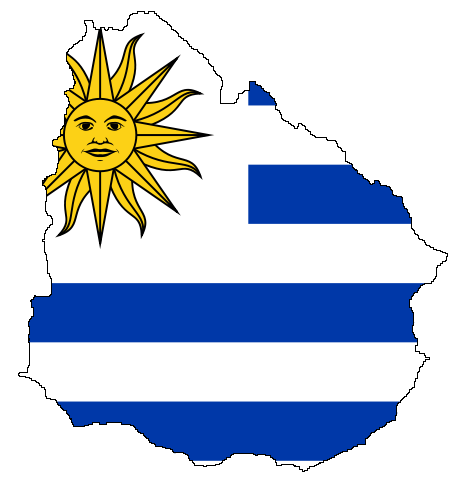Current drug laws Drugs and Democracy in Uruguay
Regions
Active legislation in Uruguay around drugs.

The current legislation is Law 14.294, passed in 1974 and modified by Law 17.016 in 1998 and Law 19.172 in December 2013. Article 2 of the latter stipulates that, "Without prejudice to the provisions of Decree-Law No. 14.294, (...) the state will take control of regulating the activities of import, export, planting, cultivation, harvesting, production, acquisition in any capacity, storage, marketing and distribution of cannabis and its derivatives, or hemp when appropriate, through the institutions to which it grants legal mandate." Thus, with the exception of cannabis, which now has its own rules, the law allows the use of any substance but penalises possession not meant for consumption. Even so, the law does not establish a legal mechanism for obtaining substances; neither does it set maximum amounts for personal use, which are left to the judge's discretion.
Law 17.016 of 1998 replaces several of the provisions of Decree-Law 14.294 of 1974, and includes five new chapters. In recent years additional laws have been enacted, namely Law 18.046 of 2006, Law 17.835 of 2004 and Law 18.494 of 2009. Law 18.046 introduced some reforms in relation to confiscated property and important new rules on the issue of money laundering. Traditionally, it has been understood that the legal interest served by the specific criminal conduct defined by drug laws is limited exclusively to public health. Nonetheless, the reform that includes provisions on money laundering also adds "the economic order of the state" as a legal interest protected by this legislation.
Initially, drugs laws only dealt with narcotic and psychoactive substances, but Law 17.016 also included "chemical precursors or other chemical products". With respect to narcotic and psychoactive substances, Uruguayan legislation has opted not to define them and instead refers to the schedules contained in the 1961 and 1971 United Nations conventions. The new cannabis regulation modifies Article 3 of Law 14.294 concerning the planting, cultivation, harvesting and marketing of cannabis: "With regard to cannabis specifically, the growing or cultivation of plants must be authorised beforehand by the Cannabis Regulation and Control Institute (IRCCA)." Read the full text of the amended Article 3 here.
Article 30 of Law 14.294 establishes that "anyone who, without legal authorisation, produces – in any manner – raw materials or substances capable of producing psychological or physical dependency, as the case may be, (...) shall be punished by a prison sentence ranging from 20 months to 10 years." Article 6 of the new law 19.172 regulating cannabis qualifies this Article 30 as follows: "Anyone who produces marijuana by planting, growing and harvesting cannabis plants with psychoactive effects in accordance with the provisions in Article 3 of this law shall not be liable for prosecution." (See Article 6 of Law 19.172)
For the other substances, the unrestricted application of Article 30 of Law 14.294 leads to the contradictory situation of not criminalising a person who possesses a reasonable quantity because he or she bought it, while criminalising a person who has a reasonable quantity in his or her possession because he or she produced it (even though that production is in preparation for use that is not considered a crime). Article 31 also addresses illegal or illicit drug trafficking, punishing the transport of large quantities of such substances, as well as the stages prior to transit.
Article 31 of Law 14.294, which decriminalises anyone who "has in his or her possession a reasonable quantity, exclusively for his or her personal consumption", is also modified by the new regulation. In the case of cannabis the quantity is now established at 40 grammes. The amended text also establishes that, "Likewise, anyone who keeps, holds, stores or possesses in their home the harvest of up to six cannabis plants with psychoactive effects (…), or the harvest belonging to the members of a cannabis club, shall not be affected by the provisions made in first clause of this article." (Article 7, Law 19.172) The penalties for drug-related offences range between a minimum of 12 to 20 months and a maximum of 4 to 18 years in prison. In this regard, the 1998 amendment to Law 14.294 was very important because until then the minimum penalties did not offer the possibility of prosecution for these offences without imprisonment, nor did the law grant the benefit of probation or conditional release. Now, in contrast, as the minimums are less than 24 months of prison, such offences do not necessarily result in jail time, and provisional liberty is allowed, as are alternative sentences.
What does the law says about consumption? Is drug consumption a crime in the country?
No. Uruguayan law permits the use of any substance and does not criminalise possession for personal use. However, apart from cannabis, where Law 17.192 has established the maximum amount someone can keep for personal use at 40 grammes, permitted quantities have not been specified for other substances, and the matter is left to the judge’s discretion. Neither does the law stipulate legal ways to obtain drugs. The exception to this is cannabis, which can be obtained by growing one’s own, by buying it from pharmacies and the Ministry of Health, and by being a member of a cannabis club.
Drugs and democracy in Uruguay overview
Current drug laws
Trends in drug matters
Reform proposals and reforms to drug laws
Impact of drug laws on prison situation
Law, drug consumption and treatment
International debate on drug policy
Civil society in the debate on drugs
Drug laws and policy documents